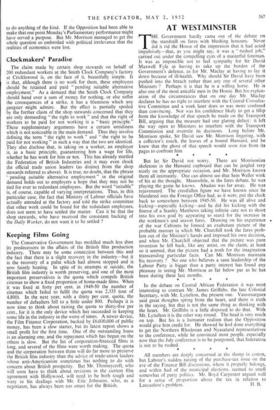AT WESTMINSTER
THE Government hardly came out of the debate on the standstill on fares with blushing honours. Never did it rid the House of the impression that it had acted impulsively—that, as you might say, it was a "rushed job," carried out under the compelling eyes of a masterful foreman. It was as impossible not to feel sympathy for Sir David Maxwell Fyfe at having to take up the burden of the Government's defence, as for Mr. Maclay at having to lay it down because of ill-health. Why should Sir David have been pushed into the breach rather than any one of several other Ministers ? Perhaps it is that he is a willing horse. He is also one of the most amiable men in the House. But his explan- ation of the circumstances that on one day Mr. Maclay declares he has no right to interfere with the Central Consulta- tive Committee and a week later does so was more confused than convincing. Nor was his confidence likely to get a fillip from the knowledge of that speech he made on the Transport Bill, arguing that the measure had one glaring defect: it left the way open to Ministers . to interfere with the Transport Commission and overrule its decisions. Long before Mr. Morrison spoke, Sir David saw Mr. Morrison fingering, with a collector's touch, the leaves of a bound Hansard, and he knew that the ghost of that speech would soon rise from its pages to confront him. * * * * But let Sir David not worry. There are Morrisonian skeletons in the Hansard cupboard that can be jangled very nicely on the appropriate occasion, and Mr. Morrison knows them all intimately. One can almost see that Sam Weller wink of his at the thought. Meanwhile, in the fares debate, he was playing the game he knows. Abadan was far away. He was rejuvenated. The crestfallen figure we have known since he blundered into the Foreign Office had, as it were, put the clock back to somewhere between 1945-50. He was all alive and kicking—especially kicking—and he did his kicking with the finesse of a Stanley Matthews taking infinite care not to shoot into his own goal by appearing to stand for the increase in the workmen's and season fares. Drawing on his experience . of the war Cabinets he limned an exuberant picture of the probable manner in which Mr. Churchill took the fares prob- lem out of the Minister's hands and imposed his own decision, and when Mr. Churchill objected that the picture was pure invention he fell back, like any artist, on the claim, at least so it seemed, that the picture had a truth for the imagination transcending particular facts. Can Mr. Morrison maintain his recovery ? No one who believes a sane leadership of the Labour Party is bigger than a party interest has found any pleasure in seeing Mr. Morrison as far below par as he has been during these last months.
* * * * In the debate on Central African Federation it was most interesting to contrast Mr. James Griffiths, the late Colonial Secretary, with Mr. Lyttelton, the present one. Vauvenargues said great thoughts spring from the heart, and there is truth in the saying, but that is not the same thing as thinking with the heart. Mr. Griffiths is a little disposed to do that. With Mr. Lyttelton it is the other way round. The head is very much on top. But his is a humaner realism than the Opposition would give him credit for. He showed he had done everything to get the Northern Rhodesian and Nyasaland representatives to the conference, while he convinced most people, especially now that the July conference is to be postponed, that federation is not to be rushed. * * * * All members are deeply concerned at the slump in cotton, but Labour's sudden raising of the purchase-tax issue on the eve of the Finance Bill discussions, where it properly belongs, and within hail of the municipal elections, seemed to smell somewhat of party politics. Mr. Boyd Carpenter argued well for a sense of proportion about the tax in relation to


































 Previous page
Previous page